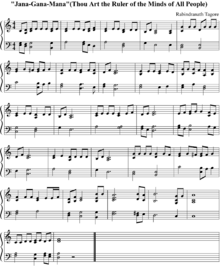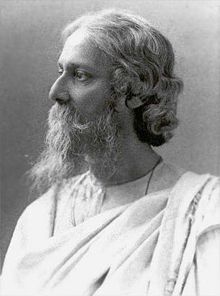Jana Gana Mana
| Jôno Gôno Mono | |
English: Jana Gana Mana (Thou Art the Ruler of the Minds of All People) Sheet music for Jana Gana Mana. |
|
| National Anthem of | |
|---|---|
| Lyrics | Rabindranath Tagore |
| Music | Rabindranath Tagore |
| Adopted | 1950 |
Jana Gana Mana (Bengali: জন গণ মন Jôno Gôno Mono) is the national anthem of India. Written in highly Sanskritized Bengali, it is the first of five stanzas of a Brahmo hymn composed and scored by Nobel laureate Rabindranath Tagore. It was first sung at the Calcutta Session of the Indian National Congress,on 27 December 1911. Jana Gana Mana was officially adopted by the Constituent Assembly as the Indian national anthem on January 24, 1950.[1][2][3] The music for the "current version" is said to be derived from a composition for the song by Ram Singh Thakur, although some dispute this.[4][5][6][7]
A formal rendition of the national anthem takes about forty-eight to fifty-two seconds. A shortened version consisting of the first and last lines (and taking about 20 seconds to play) is also staged occasionally.[1]
Contents |
Lyrics
Although written in Bengali, the pronunciation of the anthem varies considerably across India due to the country's extensive linguistic diversity. The transcription below reflects the original Bengali pronunciation, in both the Bengali script and romanization. Many of the silent letters found in the lyrics are pronounced by speakers of other Indian languages, reflecting a spelling pronunciation of the Bengali text, and often matching the pronunciation of the cognate words in the speaker's native language.
| Bengali script | Wikipedia Bengali transcription | NLK transliteration |
|---|---|---|
|
|
Jana gaṇa mana adhināyaka jaya hē |
Translation into English
O! Dispenser of India's destiny, thou art the ruler of the minds of all people[8]
Thy name rouses the hearts of Punjab, Sindh, Gujarat, the Maratha country,
in the Dravida country, Utkala and Bengal;
It echoes in the hills of the Vindhyas and Himalayas,
it mingles in the rhapsodies of the pure waters of Yamuna and the Ganges.
They chant only thy name.
They seek only thy auspicious blessings.
They sing only the glory of thy victory.
The salvation of all people waits in thy hands,
O! Dispenser of India's destiny, thou art the ruler of the minds of all people
Victory to thee, Victory to thee, Victory to thee,
Victory, Victory, Victory, Victory to thee!
Controversies
Controversy exists regarding the appropriateness of Jana Gana Mana as the national anthem of an independent India. The poem was composed in December 1911, precisely at the time of the Coronation Durbar of George V, and is considered by some to be a paean in praise of "the overlord of India's destiny". The composition was first sung during a convention of the then loyalist Indian National Congress in Calcutta on Dec. 16, 1911.[9] It was sung on the second day of the convention, and the agenda of that day devoted itself to a loyal welcome of George V on his visit to India. The event was reported thus in the Indian press:
"The Bengali poet Babu Rabindranath Tagore sang a song composed by him specially to welcome the Emperor." (Statesman, Dec. 28, 1911)
"The proceedings began with the singing by Babu Rabindranath Tagore of a song specially composed by him in honour of the Emperor." (Englishman, Dec. 28, 1911)
"When the proceedings of the Indian National Congress began on Wednesday 27th December 1911, a Bengali song in welcome of the Emperor was sung. A resolution welcoming the Emperor and Empress was also adopted unanimously." (Indian, Dec. 29, 1911)
The belief gained ground that the poem had been written in honour of the visiting monarch. Others aver that the newspaper reports cited above were misguided, the confusion arising since a different song, written in Hindi by Rambhuj Chaudhary, was sung[10] on the same occasion in praise of the monarch. However, the two poems were written in different languages; Tagore already enjoyed much fame in India, and newspaper reports are both consistent and categorical on the point of Tagore having himself sung his composition on the occasion.
Other explanations for the motivations that informed the creation of the poem have been proposed. On a visit to India, the poet Yeats received a visit from an Indian admirer who was also, in Yeats' words, "an Indian devotee" of Tagore. In a letter to a lady friend, Yeats quoted this unnamed devotee as giving him a 'strictly off the records' version of events dealing with the writing of Jana Gana Mana. That version, as presented in 1968 by the Indian Express newspaper, was this:
"He (Tagore) got up very early in the morning and wrote a very beautiful poem.... When he came down, he said to one of us, 'Here is a poem which I have written. It is addressed to God, but give it to Congress people. It will please them."[11]
Thus, Tagore is said to have written the poem in honour of God. In a letter to Pulin Behari Sen, Tagore himself wrote:[12]
"A certain high official in His Majesty's service, who was also my friend, had requested that I write a song of felicitation towards the Emperor. The request simply amazed me. It caused a great stir in my heart. In response to that great mental turmoil, I pronounced the victory in Jana Gana Mana of that Bhagya Vidhata [ed. God of Destiny] of India who has from age after age held steadfast the reins of India's chariot through rise and fall, through the straight path and the curved. That Lord of Destiny, that Reader of the Collective Mind of India, that Perennial Guide, could never be George V, George VI, or any other George. Even my official friend understood this about the song. After all, even if his admiration for the crown was excessive, he was not lacking in simple common sense."
In 2005, there were calls to delete the word "Sindh" and substitute it with the word Kashmir. The argument was that Sindh was no longer a part of India, having become part of Pakistan as a result of the Partition of 1947. Opponents of this proposal hold that the word "Sindh" refers to the Indus and to Sindhi culture and people which are an integral part of India's cultural fabric. The Supreme Court of India refused to tamper with the national anthem and the wording remains unchanged.
In July 1985 in the state of Kerala, some of the Jehovah's Witnesses' children were expelled from school under the instructions of Deputy Inspector of Schools for having refused to sing the national anthem, Jana Gana Mana. A parent, V. J. Emmanuel, appealed to the Supreme Court of India for legal remedy. On August 11, 1986, the Supreme Court overruled the Kerala High Court, and directed the respondent authorities to re-admit the children into the school. The decision went on to add: "Our tradition teaches tolerance, our philosophy teaches tolerance, our Constitution practices tolerance, let us not dilute it".[13]
English composition in Madanapalle
Rabindranath Tagore translated Jana Gana Mana from Bengali to English and also set it to music in Madanapalle, a town in Andhra Pradesh.
Though the Bengali song had been written in 1911 itself, it had remained largely confined to the pages of the Brahmo Samaj journal, "Tatva Bodha Prakasika", of which Tagore was the editor.
During 1918-19, Tagore accepted an invitation from friend and controversial Irish poet James H. Cousins to spend a few days at the Besant Theosophical College, of which Cousins was the principal. On the evening of February 28, he joined a gathering of students and upon Cousins' request, sang the Jana Gana Mana in Bengali. In the days that followed, enchanted by the dreamy hills of Madanapalle, Tagore wrote down the English translation of the song and along with Cousins' wife, Margaret (an expert in Western music), set down the notation which is followed till this day.[14]
Today, in the library of Besant Theosophical College in Madanapalle, the framed original English translation is displayed.
Media
See also
- Vande Mataram
- Jana Gana Mana Video
- An earlier poem by Tagore (Amar Shonar Bangla) was later selected as the national anthem of Bangladesh.
Notes
- ↑ 1.0 1.1 National Anthem - Know India. Nation Portal of India. Government of India.
- ↑ Bhatt, P.C., ed. (1999). Constituent Assembly Debates. XII. Lok Sabha Secretariat.
- ↑ Volume XII. Tuesday, the 24th January 1950. Online Transcript, Constituent Assembly Debates
- ↑ Ganpuley's Memoirs.1983. Bharatiya Vidya Bhavan.p204
- ↑ Rajendra Rajan (May 4 2002). "A tribute to the legendary composer of National Anthem". The Tribune.
- ↑ "Controversy over Jana Gana Mana takes a new turn" (HTML). Rediff. Retrieved on 2008-06-08.
- ↑ "Who composed the score for Jana Gana Mana? Gurudev or the Gorkha?" (HTML). Rediff. Retrieved on 2008-06-08.
- ↑ "Jana Gana Mana (India's National Anthem) - An Inferential Linguistic Analysis" (HTML). Hamilton Institute. Retrieved on 2007-07-16.
- ↑ [1]
- ↑ India: Are we still singing for the Empire? by Pradip Kumar Datta
- ↑ Genesis of Jana Gana Mana
- ↑ Tagore and Jana Gana Mana, Monish R. Chatterjee, University of Dayton.
- ↑ "Bijoe Emmanuel & Ors V. State of Kerala & Ors [1986 INSC 167]". World Legal Information Institute (August 11, 1986).
- ↑ Vani Doraisamy. "India beats: A Song for the Nation" (HTML). The Hindu. Retrieved on 2007-07-25.
References
- Dutta, K & A Robinson (1995), Rabindranath Tagore: The Myriad-Minded Man, St. Martin's Press, ISBN 0-312-14030-4.
External links
- National Anthem - Know India. National Portal of India. Government of India. (Also contains the official version of the Indian Narional Anthem in mp3 format
- Indian Anthem in MIDI Format.
- A rendition of Indian Anthem in MP3 format from the Indian embassy in Lisbon, Portugal.
- Video of Jana Gana Mana as performed by various vocalists and instrumentalists.
- Genesis of Jana Gana Mana
|
|||||
